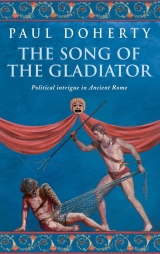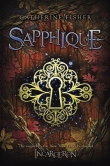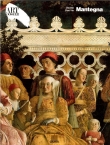
Текст книги "The Song of the Gladiator"
Автор книги: Paul Doherty
Жанр:
Исторические детективы
сообщить о нарушении
Текущая страница: 18 (всего у книги 18 страниц)
‘Why are we here?’ Burrus slapped his thigh. ‘It’s good to see you, Claudia, but why are we here? Where’s Murranus? Everyone is talking about his heroic feat. What he achieved would be hard enough even for a German, a chieftain like myself.’
Claudia put down her daisy chain. ‘Gaius,’ she leaned across, ‘I need your sword belt.’
He pulled a face, but handed it across. Claudia immediately passed it to Burrus; Gaius made to object, but Claudia held out her hand.
‘Gaius, I want you to listen to what I have to say, because I’ve brought you here away from the court, be it the Palatine or the Villa Pulchra, to accuse you of murder. You are responsible for the deaths of Dionysius, Justin and Septimus.’
‘This is nonsense,’ Gaius breathed, eyes drifting to Burrus, who was now clutching his sword belt.
Narcissus and Timothaeus gasped; Burrus looked puzzled, though the cunning German knew enough about Claudia to sense that she would not make allegations unless she was certain. Claudia pointed across to the tavern.
‘My uncle and others are in there armed. Polybius,’ she lied, ‘is a very good archer, whilst Burrus, of course, will do his very best to prevent you escaping from this garden. You are a killer, Gaius, a pagan with a particular hatred for Christians, especially the Christian community of Capua. When I first met you I brought good wishes from Spicerius. You and he were boyhood friends; you chased each other through the fields near Sisium, a small village outside Capua. At the time you changed the subject very abruptly and never mentioned it again.
‘At the Villa Pulchra I’m certain you once said you knew nothing about Capua, its Christians or the persecution there. Of course, you were lying, I can prove that. My friend Sallust the Searcher made careful enquiries, not in Capua but amongst the farming community around that town. He came across evidence concerning Lucius and Octavia Quatis. They were a childless couple who took in an orphan boy, the only son of people who had worked for them. I believe the father was an overseer on their farm. The parents died of a fever; their son, little Gaius, was raised by this kind-hearted couple and treated as their own. People always remembered Gaius and, indeed, Spicerius, playing soldiers out in the fields and woods. Scarcely in his teens, the young boy joined the army, and that was the last the local community ever saw or heard of him. They believed he had been posted abroad. By the time he’d reached any senior rank, Diocletian had launched his ferocious persecution against the Christians and Capua was brought under the scrutiny of the Emperor’s agents. Capua was dangerous because its Christians were not only slaves or minor servants but important people who were beginning to control the schools and other institutions in the town. It was a time of terror, wasn’t it, Gaius?’
She paused. Timothaeus and Narcissus were now sitting closer together, as if for protection. Burrus had thrown Gaius’s sword belt well away, and one hand rested on the hilt of his own stabbing dagger. Gaius had paled; only a bead of sweat running down his cheek betrayed his agitation.
‘I was an orphan,’ he stammered, ‘but I never knew Capua, I. .’
‘Don’t lie,’ Claudia replied softly. ‘You may have added to your name, but one thing about the Roman army, it does keep scrupulous records. Somewhere amongst those records I will find your real name, your age and where you come from.’
She paused again and sipped her wine. She looked Gaius up and down but could not detect any concealed weapon.
‘A time of terror,’ she repeated. ‘Christians from Capua and elsewhere were rounded up; it was a time for settling grudges and grievances. Dionysius and Septimus were Christian scholars who were terrorised into betraying other names. Lucius and Octavia were not Christians but somehow they got caught up in the persecution. They were only poor farmers with no one to help them, whilst their adopted son was possibly hundreds of miles away. We don’t know who betrayed them, or why; it may have been Dionysius or Septimus. I’m sure you’ve been through the records yourself, though men like Chrysis are only too willing to destroy anything about those days, when Christians were hunted like rats in a sewer.’
Claudia picked up the daisy chain, balancing it in her hand. ‘An old man and an old woman,’ she continued, ‘innocent of any crime, dragged into Rome. And of course, the more they denied their crime, the worse it become. They were kindly people, weren’t they, Gaius? Had they allowed Christians to meet on their farm, or had they sheltered a Christian? Whatever, these poor people were murdered and their farm was confiscated by the State. It would take months for you to learn the news; you were, by then, an ambitious army officer, a trusted member of the staff corps in Constantine’s Army of the West. Diocletian abdicated and the civil war broke out, but you had not forgotten.’ Claudia broke the daisy chain. ‘You returned to Rome with the conquering army and you conducted a thorough search. You are a good soldier, you know how to plan an ambush. You don’t go riding into Sisium or Capua; rather, you search the records and listen to rumour and gossip. You’re not a Christian, are you, Gaius?’
‘I hate them, I always have,’ came the quiet reply. ‘It’s a sect of slaves and anarchists. Like many officers, I believe Constantine has made the wrong choice.’
‘Do you feel he’s betrayed you?’ Claudia asked. ‘Is that why you are also the traitor in the Emperor’s camp? Have you already sold your soul, sword and loyalty to Licinius’s agents? Are you so furious at the death of your foster parents, so incensed at the Christian faith that you have lost all trust in Constantine and his mother?’
Gaius gazed solemnly back.
‘You watched and you seethed,’ Claudia continued. ‘You learned as much as you could about the horrifying details of your foster parents’ cruel capture and death. What rubbed salt in the wound was what happened to the home where you played as a child, their farm. It had been confiscated by the State but Constantine restored it to the Christian sect. Insult upon insult, injury upon injury. You discovered that Lucius and Octavia had even been buried in the Christian catacombs, only their first names carved on the tomb. The catacombs are now deserted; it would not be difficult for a soldier like yourself to creep down, break open the tomb and remove their remains for what you’d call an honourable burial.’
‘I didn’t know this.’ Timothaeus spoke up. ‘Gaius, you always seemed so tolerant.’
‘Contemptuous is a more accurate description,’ Claudia interrupted. ‘You hated the Emperor and men like Sylvester; you were ready to support Licinius.’
‘But he’s a bodyguard,’ Burrus broke in. ‘He could have killed the Emperor whenever he so wished.’
‘Could he? With other soldiers standing about? What if Constantine is murdered but his family still survive, above all the Augusta? More importantly, Gaius Tullius wanted to live. He wanted to witness the return of a new pagan Emperor who would set his face, and raise his hand, against the Christian Church. Oh, I’m sure if a new persecution broke out, Gaius Tullius would prove to be the most zealous hunter of Christians.’ Claudia spoke evenly.
‘Do continue,’ Gaius snapped. ‘I’ll listen to you, little woman, then I’ll decide.’
‘You have no choice,’ Claudia replied. ‘This may not be a court of law, but can you imagine if it was? After all, you are a soldier; you will be tried in front of a military tribunal where the rule of law is not so scrupulously observed.’
Claudia stared across at the tavern. A shutter opened and closed, and she briefly glimpsed Murranus standing there. She turned back to Gaius Tallius, spreading her hands out.
‘Astrologers claim that sometimes the stars and planets move into a favourable conjunction. This is what happened with events at the Villa Pulchra. You knew the Emperor would be going there, not the precise day, but you could make an accurate guess about when he would arrive; after all, you are one of his staff officers. You gave that information to Licinius’s agents and the war galley was dispatched. All the enemy had to do was wait for the agreed signal. You would give that from the villa, and Licinius’s agents, hiding in the woods, would pass it on. You overlooked one thing: the wanderer in the woods, that inquisitive old man who knew the lie of the land like the back of his hand. He must have realised something was wrong and came to the villa to pester Timothaeus. You decided he was too dangerous, so you killed him!’
‘That’s not true!’ Gaius Tullius broke in.
‘Yes it is.’ Timothaeus spoke up again. ‘On the day that old man was found, you left the villa early; you said you were going for a ride.’
‘You were busy plotting,’ Claudia continued, shifting on the grass, staring back at the tavern window. ‘You were planning not only to betray your Emperor, but to seize a splendid opportunity for revenge. The Christians were coming to the Villa Pulchra, the orators from Capua, at least two of whom you suspected of being turncoats. Those orators are lonely men, much given to brooding; they like to be by themselves. You didn’t really care who died as long as you inflicted revenge and depicted these Christians to their Emperor as being as murderous, quarrelsome and vindictive as the rest of his subjects.’
‘You walk softly,’ Burrus interrupted. ‘That is how you killed Dionysius. .’
Gaius Tullius dismissed him with a contemptuous flick of his hand.
‘You killed them,’ Claudia accused him. ‘You caught them on their own, like rabbits in a snare. Dionysius you stunned, then cut to death. Next came Septimus, and finally Justin. You must have been pleased to use Dionysius’s corpse, and that of the wanderer, as part of your beacon light.’
‘I was with you when the House of Mourning caught fire. .’
‘Of course you were.’ Claudia smiled. ‘But you also knew Narcissus was fast asleep. It is easy to take a length of old rope, grease it with oil, strike a tinder and watch the flame burn fiercely but slowly away, giving you sufficient time to be with a witness when the conflagration broke out. The House of Mourning was neglected, Narcissus had drunk deep; it posed little problem.’
‘Why did you burn it?’ Narcissus asked crossly.
‘As I’ve said, it was the beacon light,’ Claudia accused. ‘The agreed signal for the assault on the villa to be launched. You also wanted to conceal your own handiwork, just in case you’d made a mistake: the way you tied those ropes around Dionysius, perhaps, or that I might examine the corpse of that old man and wonder if he were a murder victim too. You really didn’t care. If the attack had been successful, Licinius’s men would have taken you away, ostensibly as a captive, though one who would later change sides.’
Gaius Tullius made to rise, but Burrus’s hand went to his war belt and the soldier slumped back down. Some colour had returned to his face, but his darting glances and the way he kept wetting his lips betrayed his agitation.
‘You enjoyed killing them,’ Claudia continued. ‘You did your best to confuse me by pretending that Justin had been murdered by someone not used to drawing a bow, just as you tried to frighten me with that painting on the wall, or by coming into the cellar, your face hidden behind a mask, an old cloak about you. When I wouldn’t be cowed, you threw that lamp into my chamber. Gaius Tullius had every right to be in the imperial quarters; it was easy enough to conceal a lamp under your cloak and, when the passageway was empty, open a door and throw it in. The rest of the villa was sleeping; you thought I’d be doing the same.’ Claudia leaned over and touched Narcissus’s hand. ‘But, the gods be thanked, I was talking to my new-found friend!’
‘When the Holy Sword disappeared,’ Timothaeus pointed his finger, ‘you enjoyed the confusion.’
‘That helped his plan,’ Claudia agreed. ‘The Emperor was tired, the Augusta worried about the coming debate, the orators from Capua were at each other’s throats, the Holy Sword had disappeared; such confusion helps to distract people. When I found out about the beacon lights, you decided to deepen the confusion further by supposedly discovering that bow, and the fire arrows.’ Claudia leaned closer. ‘You did find them, don’t you remember, near the wall?’
The accused stared sullenly back.
‘You hoped the burning of the House of Mourning would be seen as an accident or as caused by someone loosing fire arrows into the air. However, on that night,’ Claudia nodded at Narcissus, ‘our sharp-eyed former slave here was sitting on top of a hill brooding about his future. He saw no fire arrows. More importantly, once the court left the Villa Pulchra, I returned and organised a search of the woods.’
‘Yes, yes, I heard about that,’ Timothaeus broke in.
‘I told the servants to search for any weapon of war.’ Claudia smiled. ‘Now, Gaius, if you loose an arrow up into the sky, the flame eventually dies, but part of the feathered shaft remains. Yet nobody found anything. The quiver you supposedly discovered was fairly empty; it would take at least four or five arrows to attract the attention of Licinius’s agents.’ She pointed her finger at him. ‘That’s when I began to suspect you.’
‘You have no real proof.’ Gaius Tullius wiped sweaty hands on his tunic.
‘Don’t I?’ Claudia retorted. ‘There is a logic to what I’ve said. We can search the army records. We can establish a strong link between you and Capua. We can prove that, as an officer, you could go anywhere in that villa, and you did: you kindly brought me that scroll you found in Dionysius’s chamber, anything to deepen the confusion and sharpen the rivalry between your enemies. Above all, we can keep you prisoner here while your own chamber and possessions are ransacked. .’
Gaius Tullius closed his eyes and turned away, a sign that he was conceding defeat.
‘We’ll find something,’ Claudia insisted, ‘which connects you with Licinius, which will prove you to be the traitor.’
‘I am no traitor.’ Gaius stared up to the sky. ‘At least not to Rome, but to the fools who wear the purple.’ He took a deep breath. ‘It is as you say, a coming together of events.’ He made himself comfortable on the grass, talking softly as if to himself. ‘I couldn’t believe my good fortune. The attack on the villa was planned. Constantine and his bitch of a mother did not deserve my loyalty, or to wear the purple which men like me had won in the heat of battle. I later learnt about the orators coming. Oh yes, I had been through Chrysis’s records. They were all weaklings who couldn’t even support their own faith; men like Septimus had betrayed the only two people I really loved. I felt like a fox in a barnyard. It was just a matter of seeking every opportunity, creating chaos, and if the attack had been successful, don’t worry, little mouse, I would have ensured they all died.’ He gestured back at the tavern. ‘Is Murranus watching me? Shall I tell you something? When he brought Meleager down, I advised the Emperor to spare him. Do you know why?’
‘Yes, yes, I think I do.’ Claudia half smiled. ‘The Holy Sword had been found, the attack on the villa beaten off; you are sharp-eyed, Gaius, and calm. You saw how I fled from the triclinium the night I met Meleager. You claimed you knew all about me. I suspect you were one of the few people in that room who realised I’d met the man who raped me and killed my brother. Meleager was also a gladiator; what did he call himself? The Marvel of a Million Cities.’ Claudia used her fingers to emphasise her points. ‘Meleager fought in cities in the East. He could be cast as a supporter of Licinius. Secondly, he had good reason to fear me, hence your attack on me at the villa; Meleager could be blamed. Thirdly, Meleager was linked to Capua; he may well have been a torturer when the Christians were persecuted, so he could be viewed as a man who had a motive for silencing the likes of Dionysius and Septimus. Finally, he was at the villa when all the murders took place and the attack was launched. Were you going to use him as your cat’s paw, a scapegoat for the murders? You are a powerful officer, Gaius, it could be so easily done.’
Gaius lowered his head and laughed softly. ‘One favour.’ He raised his head. ‘Not on the cross! I don’t want to die nailed to a piece of wood.’ He gestured at Burrus. ‘You have your men outside; not far away lies a stretch of wasteland.’ He glanced at Claudia, begging her with his eyes. ‘I’m a soldier, I deserve a better death.’
Claudia glanced at Timothaeus, who nodded imperceptibly.
‘Let him fall on his sword.’ Burrus rose to his feet, gesturing at Gaius Tullius to stand. ‘I’ll take your Murranus with me; he can be the official witness.’
Gaius Tullius was now brushing the grass from his tunic, slowly, as if preparing to go for a stroll. ‘Well, mistress?’ He glanced at Claudia.
‘Go!’ Claudia nodded at the tavern. ‘Take Murranus with you, let it be done quickly.’
Gaius’s hands went to the small purse on his belt. He undid the cord and threw the pouch at Narcissus. ‘Take care of my body.’ Then, spinning on his heel, he allowed Burrus to guide him by the arm across to the tavern.
Claudia sat and listened. She heard Polybius exclaim. Murranus came out and lifted his hand; Claudia nodded back.
‘I didn’t think. .’ Narcissus began.
‘Hush now,’ Claudia whispered. She rose to her feet and walked down to the vine trellis to stare at the ripening grapes. She plucked one, squeezing it between her fingers, watching the purple juice drip. She closed her eyes. Somewhere close by, on a piece of wasteland, Gaius Tullius would be kneeling, grasping the hilt of his sword, ready to thrust it deep between his own ribs. She recalled his handsome, boyish face. ‘So much blood,’ she whispered. She opened her eyes and stared at the trellis again. Yet she also felt relieved. Meleager was dead. She’d experienced justice for herself and Felix. Now she could reflect on that, open her heart to Murranus and close that door against the horde of ghosts from her past.
‘Mistress?’ Claudia turned round. Narcissus stood staring sorrowfully at her. ‘Will our lives change?’
‘Of course they will.’ Claudia smiled. ‘Haven’t you learned that yet? Our lives are always changing! Now come.’ She grasped him by the arm. ‘I think it’s time we both had words with Uncle!’








